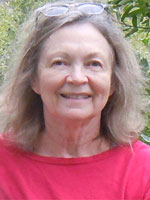Poems by Judy Brackett
Archives: by Issue | by Author Name

Great-grandmother Explains Global Warming
by Judy Brackett
Judy lives in the northern Sierra Nevada foothills just uphill from Deer Creek and minutes away from the South Yuba River.

One autumn the leaves did not fall—
not linden, not maple, not aspen, not oak—
turned crimson, turned pumpkin, turned daffodil
yellow but clung to their trees, perplexing
the squirrels, the deer, and the grownups.
As the air buzzed electric with wonder, with worry,
with nature gone haywire, great cosmic malfunction—
starbits pinging on rooftops and glittering the village,
and cloudsnippets, leafsize, swirling to earth
like heaven’s own feather beds split, and children swam
through the down and raked mammoth piles, tunneling
and jumping and sneezing.
While grownups wrung hands and called meetings,
climbed ladders, wrote letters, scraped bark,
and scanned the strange skies,
their children romped in the star chips, littering light,
then snuggled in beds, cloudfluff in their hair,
starshine on their pillows. On the night
of the solstice, full winter came on—hail and rain,
gray-blanket skies, snow and ice-sequined trees,
warm hues of the leaves bleeding through,
and everyone waited for springtime, half dream
and half dread, praying for green, for stars
in the heavens, for all’s right with the world.
© Judy Brackett
Migration
by Judy Brackett
From Canary Spring 2015

In the cold twilight, Sandhill Cranes gather in cornfields along the river, the beautiful, the beautiful river, countless flocks of ten or twenty or more, gleaning snacks from crop stubble before lifting off and settling on sandbars in the frigid waters of the Platte.
On the icy bridge a hundred yards away, seven silent watchers gather, their noses burning and dripping, fingers numbing, and set up tripods and fancy cameras (no flashes allowed) while the cranes fidget, making gargly, warbly noises, elbowing one another, checking on their mates and their spindly-legged young —colts, they’re called—watching the watchers, and finally quieting as the March darkness deepens, enveloping the thousands of cranes, now one inky, shifting mass in the shallow depths.
Before first light the watchers are back again to spy as the cranes awaken and shuffle about until the sky is right and they rise from their marshy roost in a cloud, one whooshing ululation like angels on their way to some kind of crane heaven or just to cruise to nearby fields to feed another day or few, and then in great herds, like upside-down cyclones, soar to the thermals, gliding and riding them north, miles and miles of sun-frosted ribbons.
If Sandhills had four legs, they’d be horses, Pegasi. Their lightning—silver shooting through blue, their thunder—echoes of nine million years of wingbeat and song across the plains.
Earthbound, the watchers are left to wait another year, admiring their beautiful, flat photographs. And the shallow Platte abides, still and shining.
© Judy Brackett
The Sea
by Judy Brackett

The sea at sunset on Poipu Beach gives up salty warmth,
smooth glass and coral shards, seashells cradling songs
from distant shores, and a fish skeleton, perhaps
a triggerfish, its gold scales and humuhumu-long-name
still tumbling in the foam. Sea cucumbers pass
from one bronze boy's hand to another’s;
glossy black chickens burble and peck at the sand;
a green sea turtle pulls herself onto the spit,
head nodding, eyes squinting at camera
flashes. A little girl sits a couple of yards away,
watching, motionless, arms hugging legs,
chin resting on knees, barely breathing.
And spent waves, firelit by the dying sun,
lap up our footprints, our castles.
First published in New World Writing.
© Judy Brackett